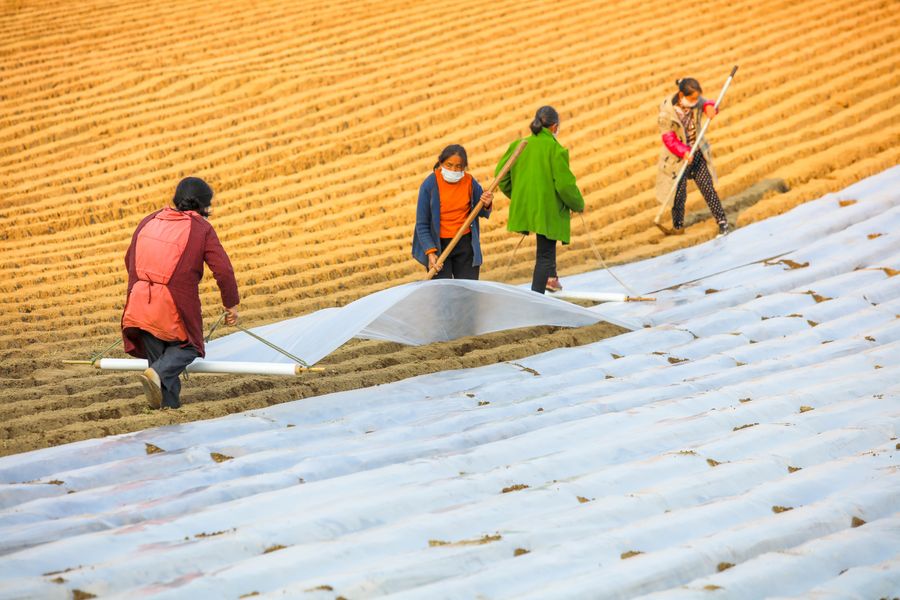
Villagers wearing face masks work in fields in Sangshulin Village, Tuopai Township of Shehong City, southwest China's Sichuan Province, Feb. 11, 2020. (Xinhua/Liu Changsong)
Farmers in China's Shandong start plowing at the same time as in previous years, but the difference is that they all wear masks. They are confident of this year's income.
JINAN, Feb. 12 (Xinhua) -- Wearing a face mask, farmer Qiu Youliang headed to the fields early in the morning in east China's Shandong Province.
Qiu is from Qiuzhuang Village in the city of Tengzhou, known for its potato plantations. Early February, or around the Chinese solar term of "beginning of spring," is the best time for growing spring potatoes here.
Although the spread of the novel coronavirus is yet to be contained, the epidemic has not delayed the spring plowing in the rural areas across the country.
In the field, local farmers including Qiu were busy preparing the soil, sowing seeds, covering the buried seeds with film and putting up greenhouses.
Qiu brought home 24,000 yuan (3,400 U.S. dollars) last year from growing spring potatoes in the greenhouse.
"I don't think the epidemic will affect my income this year," he said.
Spring potatoes in Tengzhou are usually harvested in late April and early May, and Qiu said he was confident that the spread of the virus would be contained by then.
Village Party chief Niu Jialiu said villagers started plowing on Feb. 3 and all of them were required to wear masks while working.
"Six members at most from each family are allowed to farm at the same time and they should scatter in the field," he said. "We advised the farmers to keep a distance of more than two meters between each other."
Niu said the township government provided some of the masks and the village committee organized the purchase of the rest.
The township government also offers disinfectant free of charge, and a local farming cooperative has organized disinfection using drones. So far, 37 villages have been disinfected.
To avoid cross-infection, villagers currently buy all daily necessities via the Internet, according to Niu.
"We have an online shopping service station in the village, and the elderly who have trouble shopping online can get help there," he said.
Li Guangyao, chief of Tengzhou's bureau of agriculture and rural affairs, said 26,700 hectares of spring potatoes are estimated to be planted this year, with the majority of the work already completed.
"The total area of cash crops, including spring potatoes, is expected to be slightly larger than that of last year," he said.
While engaged in spring farming, Tengzhou has also organized a potato delivery to Wuhan, the epicenter of the coronavirus spread which has been locked down. On Feb. 1, locals from the city's Longquan Village sent 66 tonnes of potatoes worth more than 200,000 yuan to Wuhan, part of the country's efforts to guarantee the food supply of the megacity.
Potato farming in Tengzhou dates back 100 years to the late 19th century. In 2000, the city was named as the "home to potatoes in China" by the former Ministry of Agriculture.
Potato yields exceed 75 tonnes per hectare in the city's major production area, with nearly one million tonnes of potatoes sold every year across China, as well as Japan, Russia and Southeast Asia.
China's "No. 1 Central Document" released last week prioritized policy support and key tasks regarding the development of agriculture and rural areas, calling agriculture, rural areas and rural people "the ballast stone" of economic development. ■



